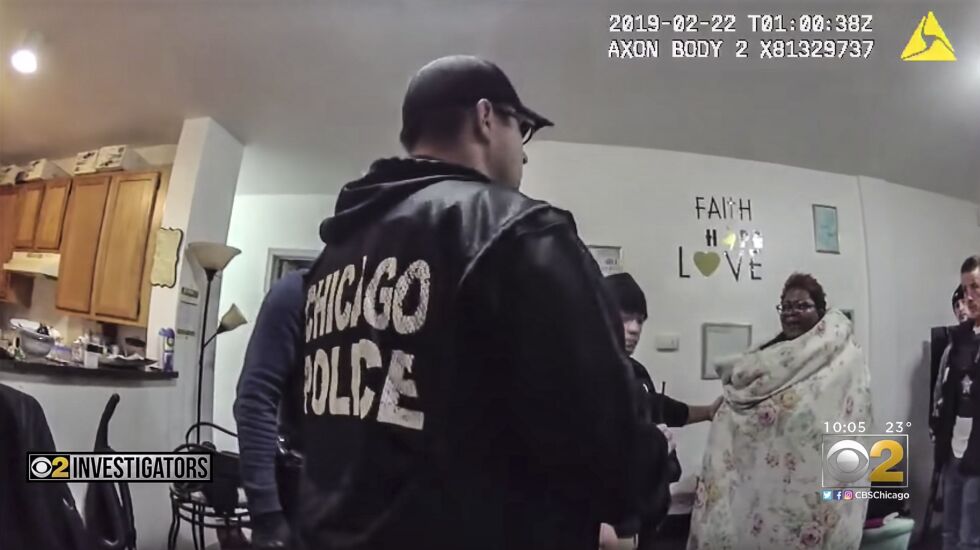
Toni Tate was getting ready for bed in the summer of 2019 when armed Chicago police officers broke down the front door of her South Side apartment and screamed “search warrant!” and “get down on the ground!”
Tate, a nurse, later filed a lawsuit in federal court accusing the officers of searching the wrong home with their weapons drawn, terrorizing family members including her infant daughter. Last year, Chicago city officials agreed to settle the case, paying Tate more than $216,000 and her attorney Al Hofeld Jr. more than $108,000 in legal fees.
Months before the police raid of Tate’s home, Chicago cops mistakenly searched the Near West Side apartment of Anjanette Young, who was handcuffed and left standing naked even after the officers realized they had the wrong address, an investigation found.
In late 2020, the Chicago Police Department released the officers’ body-camera videos of the Young search. Outrage over the footage, in which Young repeatedly tells the officers through her sobs, “You got the wrong place,” prompted the department to revise its search warrant policy in an effort to prevent such botched raids from happening again.
Those May 2021 reforms increased the supervision and paperwork required for search warrants.
Since the reforms, records show, there has been a massive decline in the number of raids by the police on homes in Chicago. Officers executed more than 2,900 residential search warrants in 2017, nearly 1,700 in 2018, about 1,380 in 2019 and 509 in 2020, according to city records.
In 2021, the number of residential searches dropped to 172, and there were 183 last year.
Only 16 of the 122 warrants that officers executed in July 2022 involved searches of homes, a Chicago Sun-Times analysis found. Officers made an arrest in half of those raids and found guns in six. Most of the other warrants involved searches of electronic devices such as phones and computers.
Though the reforms were meant to make it less likely that the police would again raid the wrong home, as they did with Young, some in law enforcement say the sharp decline of residential search warrants also sends the wrong signal to criminals — that they can now stash guns and drugs in their homes without fear the police will find and seize them. They also note that the number of arrests plummeted in Chicago over the past decade as the number of shootings soared.

Hofeld says it’s a “positive thing” that Chicago cops are executing far fewer search warrants on homes. For decades, he says, judges approved search warrants for officers based on tips from sketchy informants.
Wrong raids have been especially traumatic for kids, according to Hofeld, who says he has represented more than 40 children in lawsuits involving homes where officers conducted wrong raids.
“We’ve had many of the children evaluated psychologically, and we found that many of them, if not most, have a PTSD diagnosis or some trauma diagnosis,” Hofeld says. “That erodes the community’s trust of the police.”
After the raid on Young’s home, then-Mayor Lori Lightfoot and then-police Supt. David Brown “got serious about conducting better investigations and requiring real supervision” regarding searches, Hofeld says.
Among the resulting May 2021 reforms:
- A high-ranking supervisor — with the rank of deputy chief or higher — must now approve every search on a home after an investigation verifies the information in the application for the warrant.
- A supervisor with the rank of lieutenant or higher must be present during the search.
- Each member of a search team must wear a body camera.
- “No-knock” warrants are prohibited until officers can show there’s a danger to their safety, and a chief approves of the warrant.
- A misconduct investigation must follow any wrongful raid.
- Officers have to fill out additional forms to document each search.
The police department is seeking public comments until the end of the month about making even more changes to its search warrant policy.
The Cook County state’s attorney’s office also has increased its oversight of search warrants.
Hofeld says residential search warrants are necessary but only in limited circumstances, like when police have solid information a suspect is hiding illegal weapons in a home.
“I get the gun problem that we have in Chicago,” he says. “Officers do a public service when they do a good investigation and they execute a warrant in a constitutional way and they recover firearms or ammunition.”
In the past, though, Hofeld says officers often ended up confiscating small quantities of drugs — and no guns.
A 2021 report by then-City Hall Inspector General Joseph Ferguson found that, from 2017 through 2020, officers’ applications for search warrants stated they were looking for drugs about 75% of the time and were hunting for guns in the rest of the raids.
The officers seized drugs in about 75% of the drug-related searches and guns in only 40% of the weapon-related searches, according to Ferguson, who also found that the targets of the raids were Black about 70% of the time.
Inspector General Deborah Witzburg, who succeeded Ferguson last year, says she doesn’t know of a “magic number” of how many residential search warrants cops should be doing.
“Like all law enforcement tools, their use should be subjected to a thoughtful and well-informed cost-benefit analysis, where genuine demonstrable operational value is weighed against risk and cost,” she says. “And those risks and costs include safety risks to members of the department and members of the public.”
Eric Winstrom, the police chief in Grand Rapids, Mich., who formerly was commander of the Chicago Police Department’s Area 5 detective headquarters, says his department, which serves a city of about 200,000, averages about 40 residential search warrants a year. Chicago, almost 15 times larger, should be doing far more than the 183 home searches that were conducted last year, he says.
“I’m thinking at least two a day — one on the North Side and one on the South Side,” Winstrom says. “Maybe even twice that.”
That would add up to between 730 and 1,460 home searches a year in Chicago.
“I know, judging by the murders that are still going on, that there is still cause for this type of police enforcement in Chicago,” Winstrom says.
He says that, with so many fewer home searches, criminals “are absolutely going to become more emboldened and feel more free to do their illegal business,” figuring the chances are low they’ll face a police search of their homes.

Winstrom says cops aren’t seeking many search warrants in Chicago because they’re afraid of the consequences of making a mistake. He points to Sgt. Alex Wolinski, who was a supervisor at the Young raid, which resulted in the city agreeing to pay her a $2.9 million legal settlement. Earlier this month, the Chicago Police Board voted 5-3 in favor of firing Wolinski for a “failure of leadership.”
Winstrom says it’s a travesty that Wolinski took a fall for a warrant approved by his lieutenant.
“Long gone are the days that that a superintendent can, with a straight face, say, ‘Hey, you know, if you make a mistake, I got your back,’ ” Winstrom says. “Anybody on a [tactical] team now is, like, ‘Well, what is the benefit of doing a search warrant? I might get a gun. I might also lose my job.’ ”
Winstrom says that, when the Chicago Police Department was doing thousands of home searches a year, “it wasn’t as focused on violent crime as it should have been. The metrics of success weren’t always tied to actual success. It became more of a numbers game.
“Success should be defined as: ‘Did we get guns? Did we do something to prevent violence?’ ”







